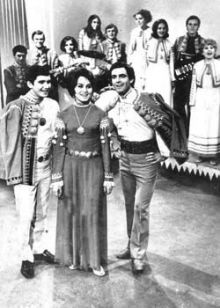Forty years have elapsed since an amateur music group made its debut in Vyzhnytsia, a small town in the Carpathian Mountains, which was destined to open a new page in the history of Ukrainian pop music.
Levko Dutkivsky was serving in the Soviet army when the Beatles from Liverpool were at the peak of their popularity. Their catchy songs were so wonderful that, despite the restrictions of the Communist Party and the Komsomol, the younger generation in Ukraine was eager to listen to every concert they could catch on the air and tried to record them with their primitive tape recorders.
Dutkivsky also liked the new music. He had a diploma from a music college, and he was instructed to form a soldiers’ ensemble. Soon the group became popular with a number of army units. After demobilization, he returned to his native village of Slobidka by the Cheremosh River. He was looking for a job and eventually found a position as a methodologist at Vyzhnytsia’s oblast House of Culture in Bukovyna. There was already a female vocal ensemble here that was touring local collective farms and government-run forestries scattered on the high plains. The girls sang folk and contemporary Soviet songs borrowed from Soviet pop stars’ repertoires.
Dutkivsky, however, had something else in mind. At first he created an orchestra for which a homemade electric guitar was made. After that he invited the vocal ensemble to perform with him on New Year’s Eve in 1967. He wrote the music for “Snowflakes Are Falling” to lyrics written by his friend Anatolii Fartushniak. The song became the number-one hit of the newly-formed group, which only later became known as Smerichka. Their performance at the House of Culture was an overwhelming success.
Lidia Shevchenko became the group’s first female soloist. After
a while the group was joined by Vasyl Zinkevych, who was then a student at Vyzhnytsia’s College of Applied Art. Nazarii Yaremchuk became the group’s soloist in 1968. Interestingly, many of the group’s members had no musical training. Dutkivsky taught them all how to sing. Years later Oleksandr Borodovynsky recalled: “Smerichka was Levko’s feat. I would like to pay homage to the colossal work that Levko put into us. It took his singular talent to convince a group of people to form a dedicated team. Creating your own music — drum beats, bass guitar riffs, the insertions by the wind section — it was incredible! Rehearsals lasted until three, even four o’clock in the morning. We lived only on music and songs.”
Shevchenko had excellent chances to enroll in a music conservatory, but she simply could not see herself living in a different city, away from Smerichka. Zoia Maslova bungled her medical institute entrance exams and left for Yaremche, where the musical film Chervona Ruta was being made. Then Smerichka appeared at the Song of the Year Festival in Ostankino, the central headquarters of the Soviet Union’s television studios. One of the bureaucrats in charge of a philharmonic society in Novosibirsk or Irkutsk formally invited the group to work for him.
Yaremchuk did not see his creative life outside Smerichka. He was invited several times to move to Kyiv. Every time he declined the proposal, joking, “You have the Dnipro in Kyiv, but not our Carpathian Mountains.” People came to see Smerichka concerts from neighboring towns and villages as well as from Chernivtsi and other cities in the oblast. The press started writing about the rock group. Shevchenko recalls that the lights went out as she was performing Ihor Poklad’s song “Kokhany” (My Sweetheart), and she continued to sing in the dark. A female correspondent from the journal Ukraine was in the audience and later wrote an article about the concert.
Costumes lent Smerichka’s performances a special, charming touch. The members incorporated the best folk garment-making traditions, yet looked modern and refined. They were designed by Levko’s wife Alla, who was a graduate of Vyzhnytsia’s College of Applied Art.
Smerichka soared to the peak of popularity after the group began collaborating with the composer Volodymyr Ivasiuk. His songs “Chervona Ruta” and “Vodohrai” performed by Smerichka won the Soviet Union’s first Song of the Year televised hit parades. The group had starred in the film Chervona Ruta, which was later screened in movie theaters from the Carpathian Mountains to Kamchatka. Smerichka’s “Vodohrai” won the group first place in the all-Soviet competition “Hello, We’re Looking for Talent.”
It should be pointed out that Ivasiuk held the group and its leader in great esteem. He always showed all his new songs to Smerichka first. He never missed a rehearsal in Vyzhnytsia, although this was mostly easier said than done. The commuter train left at 8:00 p.m. and the trip lasted 2.5 hours, so to get back to Chernivtsi, he had to catch a train back at 4:00 a.m.
The group loved Ivasiuk. After the young composer moved from Chernivtsi to Lviv, he asked Smerichka to give a concert in the city, which took place at the Maria Zankovetska Drama Theater. This performance marked Smerichka and Ivasiuk’s triumph.
In 1973 Smerichka was invited to join the Chernivtsi oblast philharmonic society. They agreed and continued to work there until 1995, when Yaremchuk died prematurely.
Smerichka toured all over the USSR. Everywhere they were eagerly expected and greeted by standing applause. Komsomolskaia Pravda later wrote that the Soviet Union really did have its own Beatles — Smerichka.
Today Levko Dutkivsky, the founder of Smerichka, lives and works in Chernivtsi. Zoia Yakubovska, Nellie Trufyn, Maria Naholiuk, Daria Ryptyk, and Halyna Tyron, the members of the original amateur ensemble, also live in the city. Maria Isak works in Lviv; Myroslava Yezhelenko, in Vyzhnytsia; Raia Khotymska, Lidia Shevchenko, and Anna Burylenko, in Lviv. Although four decades have elapsed, they are still friends and often get together to recall the unforgettable.







